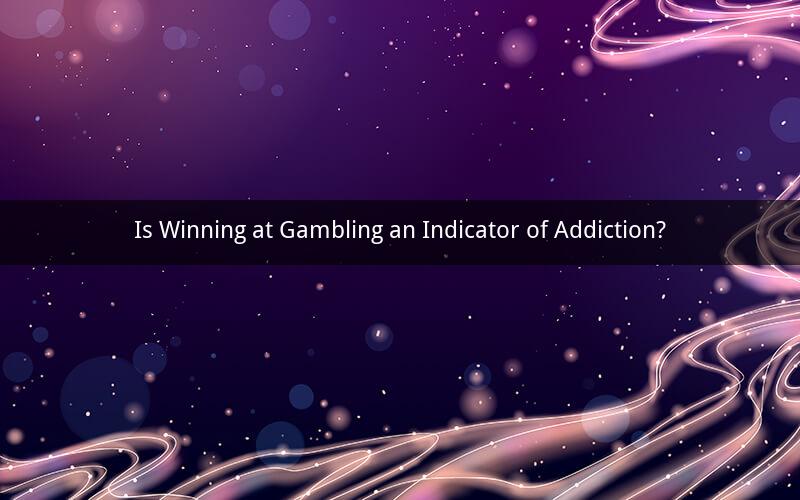
Introduction:
The concept of addiction is often associated with negative consequences and loss, but what about when the outcome is a win? Is it possible to be addicted to gambling even if you come out on top? This article delves into the complexities of gambling addiction, exploring whether winning can be a sign of problematic behavior.
1. Understanding Gambling Addiction:
To comprehend the possibility of being addicted to gambling even when winning, it is crucial to first understand what constitutes an addiction. Addiction is characterized by a compulsive need for a substance or activity, despite negative consequences. In the case of gambling, this addiction is driven by the thrill of taking risks and the potential for winning.
2. The Role of Winning in Gambling Addiction:
While winning is often seen as a positive outcome, it can also play a significant role in the development of addiction. Here are a few reasons why winning can be a red flag:
a. Reinforcement: Winning reinforces the desire to continue gambling, as it provides a sense of achievement and excitement. This can lead to a cycle of chasing bigger wins, even when there is a risk of losing.
b. Denial: Winning can make individuals in denial about their gambling habits, as they may rationalize their behavior by focusing on the positive outcomes rather than the potential for harm.
c. Escalation: Winning can create a false sense of security, leading individuals to increase their bets and take on greater risks in the hope of achieving even bigger wins.
3. Signs of Problematic Gambling Behavior:
Although winning can be a sign of problematic gambling behavior, it is essential to identify other indicators that may suggest an addiction:
a. Preoccupation: Spending a significant amount of time thinking about gambling, planning for future gambling sessions, or reliving past wins.
b. Loss of Control: Inability to control the amount of time or money spent on gambling, despite negative consequences.
c. Withdrawal Symptoms: Experiencing distress or irritability when unable to gamble or when attempting to stop.
d. Continuation Despite Consequences: Continuing to gamble despite experiencing financial, relationship, or other negative consequences.
4. The Importance of Professional Help:
If you or someone you know is experiencing problematic gambling behavior, seeking professional help is crucial. A therapist or counselor specializing in addiction can provide personalized support and guidance to overcome the addiction. Treatment options may include cognitive-behavioral therapy, support groups, and other evidence-based approaches.
5. Addressing the Underlying Issues:
While winning can be a sign of addiction, it is essential to address the underlying issues that contribute to gambling behavior. These may include:
a. Emotional Distress: Gambling can be a coping mechanism for individuals dealing with stress, anxiety, or depression. Identifying and addressing these underlying emotional issues is crucial for overcoming addiction.
b. Social and Environmental Factors: Peer pressure, exposure to gambling advertisements, and easy access to gambling venues can all contribute to the development of problematic gambling behavior. Creating a supportive environment and limiting exposure to these factors can help reduce the risk of addiction.
6. Conclusion:
In conclusion, winning at gambling does not necessarily negate the possibility of addiction. The thrill of winning can reinforce the desire to continue gambling, leading to a cycle of chasing bigger wins and potential harm. Identifying signs of problematic gambling behavior and seeking professional help are essential steps in overcoming addiction. By addressing underlying issues and creating a supportive environment, individuals can break free from the grip of gambling addiction and lead a healthier, more fulfilling life.
Questions and Answers:
1. Can winning be a sign of addiction?
Yes, winning can be a sign of addiction, as it reinforces the desire to continue gambling and may lead to increased risks and potential harm.
2. How can winning contribute to addiction?
Winning can contribute to addiction by reinforcing the thrill of gambling, leading to a cycle of chasing bigger wins and potentially escalating the risk of losing.
3. Are there any signs of problematic gambling behavior other than winning?
Yes, there are several signs of problematic gambling behavior, including preoccupation with gambling, loss of control, withdrawal symptoms, and continuing to gamble despite negative consequences.
4. What is the role of professional help in overcoming gambling addiction?
Professional help, such as therapy or counseling, can provide personalized support and guidance to overcome addiction. Therapists can help individuals develop healthier coping mechanisms and address underlying issues contributing to their gambling behavior.
5. How can I create a supportive environment to reduce the risk of addiction?
To create a supportive environment, limit exposure to gambling advertisements and venues, seek support from friends and family, and develop healthy coping mechanisms for stress and emotional distress.